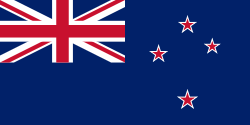| New Zealand at the 1976 Summer Olympics | |
|---|---|
 | |
| IOC code | NZL |
| NOC | New Zealand Olympic and Commonwealth Games Association |
| Website | www |
| in Montreal | |
| Competitors | 80 (71 men, 9 women) in 13 sports |
| Flag bearer | David Aspin (wrestling) |
| Medals Ranked 18th |
|
| Summer Olympics appearances (overview) | |
| Other related appearances | |
New Zealand competed at the 1976 Summer Olympics in Montreal, Quebec, Canada. The New Zealand Olympic Committee was represented by 80 athletes, 71 men and 9 women, and 29 officials. [1] The flag bearer at the opening ceremony was wrestler David Aspin.
Contents
- Medal tables
- Athletics
- Track and road
- Field
- Boxing
- Canoeing
- Cycling
- Road
- Track
- Diving
- Equestrian
- Jumping
- Field hockey
- Men's tournament
- Rowing
- Men
- Sailing
- Shooting
- Swimming
- Weightlifting
- Wrestling
- Officials
- References
In protest at a tour of South Africa by the All Blacks team early in the year, Congo's official Jean-Claude Ganga led a boycott of 28 African nations as the International Olympic Committee refused to bar the New Zealand team. [2] Some of the nations (including Morocco, Cameroon and Egypt) had already participated however, as the teams only withdrew after the first day. From Southern and Central Africa, only Senegal and Ivory Coast took part. Both Iraq and Guyana also opted to join the Congolese-led boycott. For the full list of boycotting countries, see 1976 Summer Olympics#Non-participating National Olympic Committees